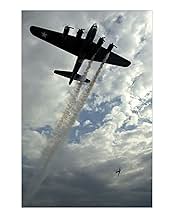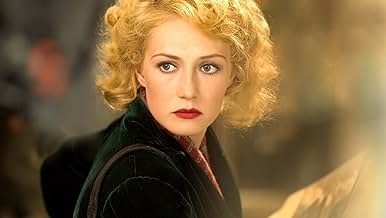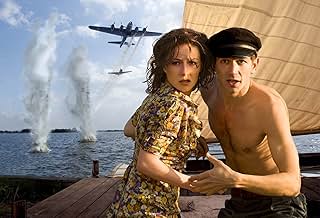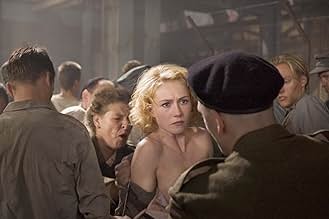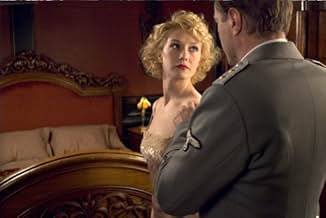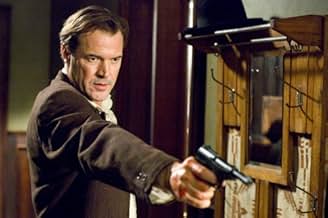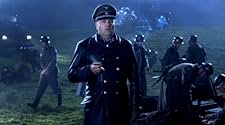CALIFICACIÓN DE IMDb
7.7/10
82 k
TU CALIFICACIÓN
En los Países Bajos ocupados por los Nazis durante la segunda guerra mundial, una cantante judía se infiltra en el cuartel de la Gestapo para informar a la resistencia.En los Países Bajos ocupados por los Nazis durante la segunda guerra mundial, una cantante judía se infiltra en el cuartel de la Gestapo para informar a la resistencia.En los Países Bajos ocupados por los Nazis durante la segunda guerra mundial, una cantante judía se infiltra en el cuartel de la Gestapo para informar a la resistencia.
- Nominada a1 premio BAFTA
- 13 premios ganados y 23 nominaciones en total
Argumento
¿Sabías que…?
- TriviaMost actors speak more than one language in the film. Carice van Houten speaks four languages fluently in the course of the film: Hebrew in the scenes in Israel, German with Nazi soldiers, English with Canadian army personnel and Dutch for the majority of the film.
- ErroresInsulin, even injected directly into the blood stream, would not act as fast as shown to lower blood sugar.
- Citas
Rachel Stein aka Ellis de Vries: I never knew this would happen. To fear the liberation...
- ConexionesEdited into Zwartboek: The Special (2006)
- Bandas sonorasIch bin die fesche Lola
Music by Friedrich Hollaender (as Friedrich Hollaender)
Lyrics by Robert Liebmann
Performed by Carice van Houten
(c) 1930 by Ufaton-verlagsgesellschaft mbH (BMG Music Publishing Germany), Munich
Opinión destacada
Director Paul Verhoeven's self-confessed aim is to combine art and business, appeal to a broad audience, and yet still have some endurance. The fame of films like Basic Instinct and Total Recall is lasting, yet they court criticism with their use of sexuality or by playing to the (easily dismissible) sci-fi genre. Graphic sex and violence are common in his movies and, when you add the occasional major flop such as Showgirls, the work of Verhoeven often fails to be taken seriously. Yet Black Book deserves respect. It is a wartime resistance movie on an epic scale, freed of the conventions of British and American war movies, yet bringing their typically high production values to a uniquely Dutch film.
Israel 1956. A Holy Land Tours bus stops off at a Kibbutz. One of the passengers recognises a teacher there, Rachel, from times they had shared during the war. As her friend leaves, Rachel thinks back to Holland in 1944. She was an accomplished cabaret singer but also Jewish. She was in hiding, waiting for the war to end. But chance misfortune means she has to try to make a getaway with some other Jewish people. They are ambushed, and she is almost shot. A little later she starts working for the resistance ('terrorists' as the Nazis call them) and infiltrates the Gestapo, seducing a high ranking officer called Muntze.
What follows is a frantic game of cat and mouse, espionage and counter-espionage. Rachel (now called Ellis) is torn between the horrors inflicted on her friends close-by and the elaborate deceits she tries to play to save them. Gradually it becomes clear that Muntze, anticipating the end of the war, is risking his neck to try to minimize death and suffering on both sides, and one or more of the resistance fighters is selling out to the Nazis to reap rich profits. Muntze, like Rachel, has had to overcome great losses. Their humanity is a bridge that brings them closer.
Rachel/Ellis is played by Carice van Houten, a leading actress of the Dutch screen. Her presence is luminous and charismatic (for British/American audiences, there is the curious sensation of watching someone unknown who radiates star quality with every breath). Her character has to adapt to many contrasting situations yet there is an underlying determination and fast thinking that shines through and makes such changes seem in character and unscripted. We share her emotional struggle and watch her pit her wits against the Gestapo (who are not exactly stupid). The movie is worth seeing for her performance alone.
On the one hand, the film has been minutely researched, based on actual events and characters; on the other it still has the slightly larger than life gloss we might associate, say, with a James Bond film. The escapes are in the nick of time, the sex scenes are steamy, and the plot twists increase exponentially as we get closer to the end.
Not content to portray the unique conditions of Holland during the occupation, Black Book goes on to catalogue post war atrocities and Rachel's eventual journey to Israel. The style and delivery will not appeal to everyone, but Black Book is Verhoeven on top form, delivering grand entertainment that shows his talents (and those of the remarkable Carice van Houten) at their finest.
Israel 1956. A Holy Land Tours bus stops off at a Kibbutz. One of the passengers recognises a teacher there, Rachel, from times they had shared during the war. As her friend leaves, Rachel thinks back to Holland in 1944. She was an accomplished cabaret singer but also Jewish. She was in hiding, waiting for the war to end. But chance misfortune means she has to try to make a getaway with some other Jewish people. They are ambushed, and she is almost shot. A little later she starts working for the resistance ('terrorists' as the Nazis call them) and infiltrates the Gestapo, seducing a high ranking officer called Muntze.
What follows is a frantic game of cat and mouse, espionage and counter-espionage. Rachel (now called Ellis) is torn between the horrors inflicted on her friends close-by and the elaborate deceits she tries to play to save them. Gradually it becomes clear that Muntze, anticipating the end of the war, is risking his neck to try to minimize death and suffering on both sides, and one or more of the resistance fighters is selling out to the Nazis to reap rich profits. Muntze, like Rachel, has had to overcome great losses. Their humanity is a bridge that brings them closer.
Rachel/Ellis is played by Carice van Houten, a leading actress of the Dutch screen. Her presence is luminous and charismatic (for British/American audiences, there is the curious sensation of watching someone unknown who radiates star quality with every breath). Her character has to adapt to many contrasting situations yet there is an underlying determination and fast thinking that shines through and makes such changes seem in character and unscripted. We share her emotional struggle and watch her pit her wits against the Gestapo (who are not exactly stupid). The movie is worth seeing for her performance alone.
On the one hand, the film has been minutely researched, based on actual events and characters; on the other it still has the slightly larger than life gloss we might associate, say, with a James Bond film. The escapes are in the nick of time, the sex scenes are steamy, and the plot twists increase exponentially as we get closer to the end.
Not content to portray the unique conditions of Holland during the occupation, Black Book goes on to catalogue post war atrocities and Rachel's eventual journey to Israel. The style and delivery will not appeal to everyone, but Black Book is Verhoeven on top form, delivering grand entertainment that shows his talents (and those of the remarkable Carice van Houten) at their finest.
- Chris_Docker
- 29 ene 2007
- Enlace permanente
Selecciones populares
Inicia sesión para calificar y agrega a la lista de videos para obtener recomendaciones personalizadas
Detalles
- Fecha de lanzamiento
- Países de origen
- Sitios oficiales
- Idiomas
- También se conoce como
- Black Book
- Locaciones de filmación
- Productoras
- Ver más créditos de la compañía en IMDbPro
Taquilla
- Presupuesto
- USD 21,000,000 (estimado)
- Total en EE. UU. y Canadá
- USD 4,398,532
- Fin de semana de estreno en EE. UU. y Canadá
- USD 112,521
- 8 abr 2007
- Total a nivel mundial
- USD 26,768,563
- Tiempo de ejecución2 horas 25 minutos
- Color
- Mezcla de sonido
- Relación de aspecto
- 2.35 : 1
Contribuir a esta página
Sugiere una edición o agrega el contenido que falta

Principales brechas de datos
What is the Hindi language plot outline for La lista negra (2006)?
Responda

